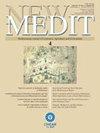Evaluation of Household Resilience Capacity Index to Food insecurity Case study: Hosein Abad Rekhneh Gol village - Iran.
IF 1.2
4区 经济学
Q3 AGRICULTURAL ECONOMICS & POLICY
引用次数: 0
Abstract
The present study estimates households' resilience against food insecurity in a selected village of Qalandar Abad district in Iran. The Resilience Index Measurement and Analysis (RIMA) of the Food and Agriculture Organization of the United Nations (FAO) was used for the first time in Iran, to achieve this goal. The samples included 149 farmers randomly selected and the Data were collected through interviews. The factor analysis method was used to estimate the components of resilience, and the MIMIC method was used to estimate the latent variable of resilience. The results showed that the components of asset and adaptive capacity had a significant role in increasing the resilience of rural households in the study area. Variables such as the land area, water availability, and the yield of crops had a significant positive role in improving the asset pillar. The households head and other members' education also had a significant positive effect in improving the adaptive capacity pillar. Therefore, due to time and budget constraints in the execution of macro-policies, adopting and implementing policies that increase the above components will improve the resilience of rural households家庭粮食不安全抵御能力指数评价——以伊朗Hosein Abad Rekhneh Gol村为例。
本研究估计了伊朗Qalandar Abad区一个选定村庄的家庭对粮食不安全的抵御能力。为了实现这一目标,联合国粮食及农业组织(粮农组织)的复原力指数测量和分析(RIMA)首次在伊朗使用。样本包括随机选择的149名农民,数据通过访谈收集。采用因子分析法估算弹性的组成,采用MIMIC法估算弹性潜在变量。结果表明,资产和适应能力的组成部分在提高研究地区农村家庭的复原力方面发挥了重要作用。土地面积、水资源和作物产量等变量在改善资产支柱方面发挥了重要的积极作用。户主和其他成员的教育也对改善适应能力支柱产生了显著的积极影响。因此,由于执行宏观政策的时间和预算限制,采取和实施增加上述组成部分的政策将提高农村家庭的抵御能力
本文章由计算机程序翻译,如有差异,请以英文原文为准。
求助全文
约1分钟内获得全文
求助全文
来源期刊

New Medit
AGRICULTURE, MULTIDISCIPLINARY-
CiteScore
2.00
自引率
30.00%
发文量
31
审稿时长
>12 weeks
期刊介绍:
New Medit is an applied economics journal, with a multidisciplinary approach, aimed at providing insights into the economic and the social transformations of agro-food sector, rural societies as well as local development and bioeconomy in the Mediterranean Basin.
Manuscripts submitted to NEW MEDIT generally should deal with wide-ranging topics that can be extended to other countries where organisational, production and market conditions and the related development policies may emerge at the corporate or regional level.
 求助内容:
求助内容: 应助结果提醒方式:
应助结果提醒方式:


